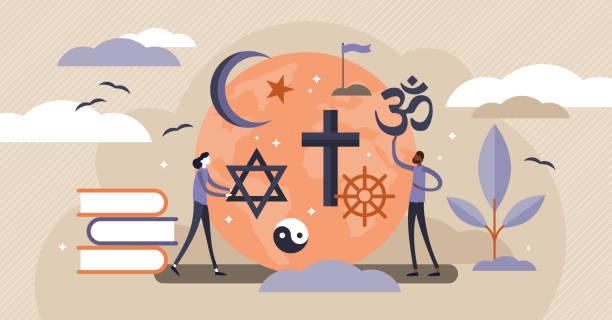Different religions offer a variety of perspectives on the afterlife and human destiny, reflecting their unique beliefs, teachings, and cultural contexts.
Here's an overview of how some of the world's major religions approach these concepts:
1. Christianity
- Afterlife: Christians believe in eternal life, where individuals are judged after death. The righteous are rewarded with heaven, a place of eternal joy in the presence of God, while the wicked face eternal separation from God in hell. Some denominations, such as Catholicism, also believe in purgatory, a temporary state of purification before entering heaven.
- Human Destiny: Human destiny is closely tied to faith in Jesus Christ and adherence to Christian teachings. Salvation, leading to eternal life, is central to Christian beliefs.
2. Islam
- Afterlife: Muslims believe in life after death, where individuals are judged by Allah. The faithful are rewarded with paradise (Jannah), a place of peace and pleasure, while sinners may be condemned to hell (Jahannam). However, God's mercy is also emphasized, and repentance can lead to forgiveness.
- Human Destiny: Human destiny in Islam is determined by one's deeds and faith in Allah. Following the Five Pillars of Islam and leading a righteous life are essential for a favorable destiny in the afterlife.
3. Hinduism
- Afterlife: Hinduism teaches the concept of reincarnation, where the soul is reborn into a new body after death. The cycle of birth, death, and rebirth (samsara) continues until one attains moksha, or liberation from the cycle, leading to union with the divine (Brahman).
- Human Destiny: Human destiny is shaped by karma, the law of cause and effect. Good deeds lead to a better rebirth, while bad deeds result in a lower form of existence. The ultimate goal is to achieve moksha through spiritual practice, devotion, and knowledge.
4. Buddhism
- Afterlife: Like Hinduism, Buddhism also believes in reincarnation. However, the focus is on escaping the cycle of samsara through enlightenment (nirvana). Nirvana is the ultimate state of liberation, free from suffering and the cycle of rebirth.
- Human Destiny: Human destiny is influenced by one's actions (karma) and the pursuit of the Eightfold Path, which leads to wisdom, ethical conduct, and mental discipline. Achieving enlightenment is the primary goal.
AfriPrime App link: FREE to download...
https://www.amazon.com/Africircle-AfriPrime/dp/B0D2M3F2JT
5. Judaism
- Afterlife: Jewish beliefs about the afterlife vary, with some Jews believing in a form of resurrection and others in the immortality of the soul. The concept of Olam Ha-Ba (the World to Come) is present, where the righteous are rewarded. However, Judaism places more emphasis on life in the present world.
- Human Destiny: Destiny in Judaism is tied to following God's commandments (mitzvot) and living a moral life. The focus is on justice, righteousness, and community, with the afterlife being a secondary concern.
6. Sikhism
- Afterlife: Sikhs believe in reincarnation, where the soul is reborn until it merges with Waheguru (God) through righteous living and devotion. Liberation from the cycle of rebirth is called mukti.
- Human Destiny: Human destiny is determined by one's actions (karma) and devotion to God. Leading an honest, truthful, and compassionate life is essential for achieving liberation.
7. Taoism
- Afterlife: Taoism emphasizes living in harmony with the Tao (the Way) rather than focusing on the afterlife. However, some Taoist beliefs include the idea of an immortal soul that can achieve a state of harmony with the universe.
- Human Destiny: Destiny is shaped by living in accordance with the Tao, cultivating virtue, and achieving spiritual immortality through practices like meditation and moral living.
8. Confucianism
- Afterlife: Confucianism is more concerned with moral conduct in this life than with the afterlife. It does not emphasize detailed beliefs about the afterlife, focusing instead on ancestor worship and the continuation of one’s influence through descendants.
- Human Destiny: Human destiny is fulfilled through moral behavior, fulfilling one’s roles in society, and maintaining harmony in relationships.
9. Indigenous and Animistic Beliefs
- Afterlife: Indigenous and animistic traditions often involve a belief in spirits and ancestors who continue to exist in a different realm after death. The afterlife is sometimes seen as a continuation of earthly life or a journey to a spiritual world.
- Human Destiny: Human destiny is intertwined with living in harmony with nature, respecting the spirits, and maintaining balance within the community and the natural world.
Each religion offers a unique perspective on what happens after death and what constitutes a meaningful and fulfilled life, reflecting broader cultural values and worldviews.
AfriPrime App link: FREE to download...


